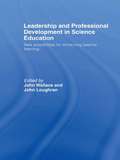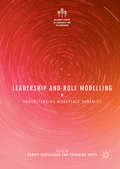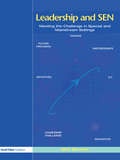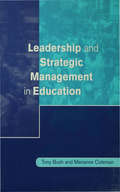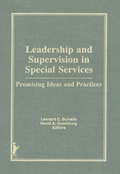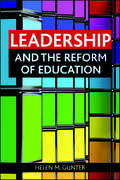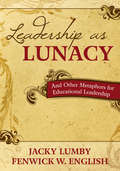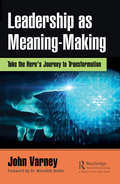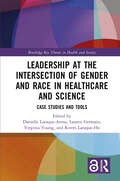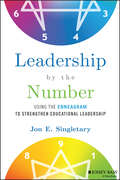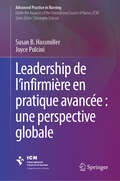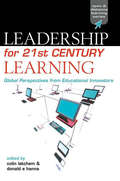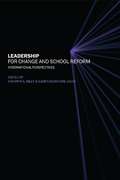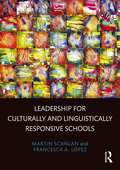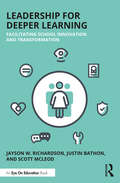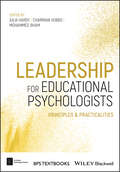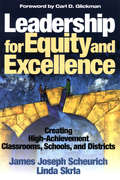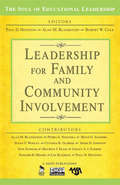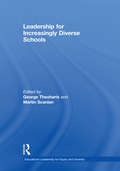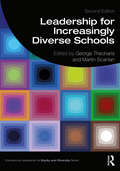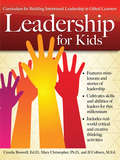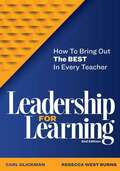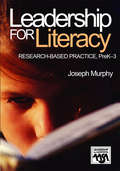- Table View
- List View
Leadership and Professional Development in Science Education: New Possibilities for Enhancing Teacher Learning
by John Wallace John LoughranLeadership and Professional Development in Science Education provides invaluable insight into the role of science teachers as learners and thinkers of change processes. The fourteen chapters, by an eminent international team of science educators, explain and explore the relationship between professional development, teacher leadership and teacher learning. Research-based practical and theoretical exemplars reflect state of the art science teacher leadership in a broad range of international contexts.The book is divided into three parts, reflecting a multi-layered approach to teacher learning:* Personal initiatives in teacher learning, focusing on individual teachers;* Collegial initiatives in teacher learning, focusing on groups of teachers;* Systemic initiatives for teacher learning, focusing on system-wide issues.Student teachers and practising teachers will find the text highly valuable as they consider and review the challenges of teaching practice and ways of working with colleagues, while school leaders and policymakers will benefit from the book's insight into system-wide issues of professional development.
Leadership and Role Modelling: Understanding Workplace Dynamics (Palgrave Studies In Leadership And Followership Ser.)
by Shruti Vidyasagar Poornima HattiThis edited volume explores the influence of role modelling as a process in the workplace; in particular, whether it can aid career development, offer psycho-social support, and provide the motivation and means to achieve goals. Chapters examine whether the dynamics of personal identification and self-belief can affect the way that role models are chosen, placing emphasis on geographical diversity and cultural aspects. By including studies of gender and followership in both American and Indian settings, the scholars and practitioners who contribute to this collection outline key aspects of role modelling, and its effect as a developmental tool in the workplace, from the perspective of the individual and organisations. This book is a valuable resource for academics interested in organisations, management, and diversity, as well as practitioners and policy-makers involved in leadership programmes, who will find its collection of both theoretical and empirical findings extremely useful.
Leadership and SEN: Meeting the Challenge in Special and Mainstream Settings
by BurnettHow can leaders turn their schools into outward looking centres of excellence? Answering that question, this book focuses upon the work of cutting edge leaders who are responding to the challenges of recent legislation and guidelines. It includes: thoughtful case studies examine school culture, restructuring and reorganization mind maps and chapter summaries to help readers get on top of crucial issues and ideas helpful pointers on how to avoid pitfalls and maximise successes. For special school leaders and prospective leaders, those involved in making decisions about specialist provision and anyone delivering training and support to those professionals.
Leadership and Strategic Management in Education (Centre for Educational Leadership and Management #2)
by Tony Bush Dr Marianne Coleman`This is one of very few texts to give recognition to the difficulties in large institutions and to give practical advice about the degree to which collegiality can be built into strategic planning. The authors provide an overview of all aspects of leadership within education, giving ample references within each section for more detailed study' - Mentoring and Tutoring `The book would constitute a good starting-point for anyone wishing to understand contemporary developments in educational management' - Educational Research Leadership and strategic management are both issues of central importance in raising achievement in schools and colleges and thus are at the heart of the educational debate today. This book is concerned with such major issues as: the nature of strategic management in education; the importance of vision, and mission; styles of leadership; models of educational management; and the purposes of strategic management, which here are equated with the effectiveness and improvement of the institution. It will be invaluable for students of educational management, such as those following masters degrees. It is also directly relevant to teachers and lecturers and schools of all phases and in further education colleges, particularly those who have, or aspire to, management responsibilities. The textbook is designed to be used either to accompany a taught course, or for self-study via distance-learning, thus practical and reflective activities are included.
Leadership and Supervision in Special Services: Promising Ideas and Practices
by Charles A Maher David E Greenburg Leonard BurrelloHere is an authoritative reference on a range of subjects vital to supervisory personnel whose responsibilities include children with learning and/or behavior problems. Leading professionals - serving as members of a special writing team of the Council of Administrators of Special Education (CASE) - offer a rich source of ideas especially for administrative personnel involved in the delivery of special educational programs and services to children with handicapping conditions. Chapters cover such topics as critical success factors, supervision and evaluation, cost analysis, and more.
Leadership and the reform of education
by Helen M. GunterWestern politicians consider that leadership is essential for the delivery of educational reform. This important and timely book examines how leaders, leading and leadership became the dominant theme in education. It presents an analysis of the relationship between the state, public policy and the types of knowledge that New Labour used to make policy and break professional cultures. It is essential reading for all those interested in public policy, education policy, and debates about governance and will be of interest to policymakers, researchers and educational professionals.
Leadership as Lunacy: And Other Metaphors for Educational Leadership
by Fenwick W. English Jacky Lumby"This book will challenge, enlighten, and transform. The authors invite us to re-examine our core values as educational leaders, reconsider our priorities, and place the humanity of children at the center of our work."—Nancy Skerritt, Assistant Superintendent,Tahoma School District, Maple Valley, WA"By their analysis, Lumby and English expose the power of language to shape meaning. By their skill, they illustrate the power of language to engage and enrich. Their work is an important contribution to how we understand and practice leadership in all fields."—Steven R. Thompson, Coordinator, School Leadership Program, Miami UniversityAn imaginative approach to rethinking and revitalizing your leadership practice!Research has shown that metaphors inspire leaders to reflect on their mind-sets, behaviors, practices, and approaches, leading to new perspectives on their roles. Using such thought-provoking and unexpected metaphors as "leadership as war" and "leadership as lunacy," the authors draw readers through historical perspectives and cognitive possibilities that inspire, resolve, confuse, and provoke reflection on the state of leadership in education. This book examines the current discourse on educational leadership models, behaviors, and roles, and helps school and district leaders:Understand the power of metaphor and how metaphors have been used to define leadershipDevelop a deeper connection to their roles and their approaches Initiate change in themselves and in othersBy inspiring creative thinking and critical reflection, Leadership as Lunacy helps leaders achieve personal and professional growth and invigorate their professional relationships!
Leadership as Meaning-Making: Take the Hero's Journey to Transformation
by John VarneyBased on the author’s 30 years experience of management development and a background in design and psychology, this book takes a fresh look at leadership as a systemic shared phenomenon. It is one aspect of the evolutionary principle of bringing people to maturity as human beings – transforming the immature through purposeful adventure. This is not a “how-to” book of tools and techniques but is a guide to personal development. It plots the territory of the hero’s journey (after Joseph Campbell) through unknown worlds. It explains the metaphorical relationship to personal and collective transformation by means of the cyclic pattern of the hero’s journey, overlaid with the enneagram framework. Succeeding chapters spell out practical details for making the journey towards maturity, which alone makes leadership a viable possibility. Only such purposeful leadership will enable others to make their own equivalent journeys. If such people are engaged in work, then they will be more conscious and more effective. Essentially, the book is intentionally quickly communicates a broad sweep of related ideas that form a philosophy for the development of the inner qualities of effective leadership, applicable in all walks of life. The story of the archetypical hero’s journey is suggested as applying to every individual. The hero’s journey is an allegory for a quest for inner growth. It can rub off onto others through what we call “leadership”. Such leadership is what brings meaning to people’s lives. Thus this book is a counter to the empty manipulative techniques propagated by much of the popular writing on leadership, which pays little attention to transformative interaction. There are exercises at the end of each chapter and additional material is available to readers via the internet.
Leadership at a Distance: Research in Technologically-Supported Work
by Suzanne P. WeisbandThis volume offers insights from a noted group of scholars who discuss the complex phenomenon of leadership in distributed work settings - also known as leadership at a distance. Editor Suzanne Weisband addresses the ubiquitous roles leaders play, their scale of work, and the range of technologies available to them, while setting new directions in
Leadership at the Intersection of Gender and Race in Healthcare and Science: Case Studies and Tools (Routledge Key Themes in Health and Society)
by Danielle Laraque-Arena Lauren Germain Virginia Young Rivers Laraque-HoThis book takes a case study approach to explore leadership narratives of women in healthcare and science, paying attention to the intersection of gender, identity, and race in each story. Putting forward a new vision and pathway inclusive of the lived experiences and contributions of women worldwide, this text proposes a strength-based approach to meeting leadership challenges. Key themes discussed include leadership redefined by those not identifying as leaders, the influence of the intersectionality of race and gender on leadership, and the implications for how we teach about leadership in healthcare and science. Grounded in theory that is translated into practice and evidenced by the leadership case studies described, the book draws out useful tools and organizational learnings to support transformation of the landscape of clinical care, education, research and policies healthcare and science. This book is an invaluable reference for leaders at all levels across healthcare and science. It is also of interest to students and academics from gender studies, leadership studies, organization and governance, anthropology, sociology, higher education, public health, social work, nursing and medicine.
Leadership by the Number: Using the Enneagram to Strengthen Educational Leadership
by Jon E. SingletaryHarness the power of ancient Enneagram philosophy to maximize your educational leadership impact In Leadership by the Number: Using the Enneagram to Strengthen Educational Leadership, distinguished academic and leadership coach Dr. Jon Singletary walks you through how to use the ancient wisdom of the Enneagram of Personality with modern contemplative practices to transform how you lead your department, school, college, or university. You'll learn to effectively balance the conflicting demands of your role with greater patience, skill, and peace-of-mind by changing how you think, act, and feel every day. In the book, the author provides: Explanations of the benefits of self-aware leadership, including the identification of competing forces and understanding stakeholders' strengths and weaknesses Insights into the critical role of self- awareness in educational leadership Concrete strategies for strengthening university, college, unit, and departmental leadership A can't-miss resource for higher education administrators and other school leaders, Leadership by the Number also belongs in the hands of students of education and leaders-in-training who wish to maximize the impact they can have on the institutions they'll one day lead.
Leadership de l’infirmière en pratique avancée : une perspective globale (Advanced Practice in Nursing)
by Susan B. Hassmiller Joyce PulciniCe livre, rédigé sous les auspices du Conseil international des infirmières, se distingue par l’accent qu’il met sur le leadership des infirmières en pratique avancée (IPA) au niveau mondial. Il présente une structure unique qui souligne l’importance de ce leadership en incluant des études de cas provenant de diverses régions du monde. Cet ouvrage, à la fois utile et pratique, explore le leadership clinique, académique et politique et s’adresse à tout lecteur concerné par cette thématique en plein essor. En outre, une section est dévolue au développement du leadership axé sur le coaching et le mentorat, l’entreprenariat, la collaboration et la défense des patients. Les auteurs sont des leaders éminents dans le domaine de l’exercice infirmier en pratique avancée issus de différentes régions du monde, accompagnés d’auteurs plus juniors, futurs leaders, qui bénéficient de leur mentorat. Ce livre séduira les infirmières en pratique avancée qu’elles soient en pratique clinique, étudiantes, ou encore leaders émergentes qui souhaitent bénéficier des enseignements dégagés des expériences mondiales pour s’en inspirer dans leur activité. C’est une ressource indispensable dans la bibliothèque de tout leader infirmier en pratique avancée, utile à tous les stades de son développement et ce, partout dans le monde. Ce livre a été traduit de l’anglais. La traduction a été réalisée à l’aide d’une intelligence artificielle. Une révision par un expert du domaine a ensuite été effectuée, principalement en termes de contenu.
Leadership for 21st Century Learning: Global Perspectives from International Experts (Open and Flexible Learning Series)
by Colin Latchem Donald E HannaThe challenge of managing education effectively is formidable. Written by two education managers, this text explores the issues associated with good leadership in educational and training institutions. It is based on their own work and on a series of detailed interviews with eminent leaders.
Leadership for Change and School Reform: International Perspectives (Educational Change And Development Ser.)
by Karen Seashore Louis Kathryn A. RileySchool reform is a top priority for governments today. This timely and challenging book, edited by leading international researchers, Kathryn Riley and Karen Seashore Louis, offers a rich comparative perspective on leadership for change and school reform. Contributors form North America, Europe and Australia demonstrate how school leadership is influenced by global pressures, differing national and state contexts and local concerns. They illustrate the limitations of reform initiatives which focus on school leaders tot he exclusion of the many other organisations which affect school, such as national and local governments, professional associations and school communities. This book raises some important questions such as:*How can school leaders create intelligent, thinking schools?*How can leadership and learning be linked together?*What are the characteristics of effective local education authorities and school districts?*What is the role of teacher organisations in educational reform and change?*What happens if businesses, teachers, parents and local communities have different views of what makes a good school?The text illustrates the ways in which leadership is rooted in learning, and identifies new directions for school leadership. It challenges conventional notions of leadership, offering an expanded view, which sees leadership just as an individual role-based function, but as a network of relationships among people, structures and cultures. This lively and provocative book should be read by all those interested in education reform.
Leadership for Culturally and Linguistically Responsive Schools
by Martin Scanlan Francesca A. LópezLeadership for Culturally and Linguistically Responsive Schools explores how schools can cultivate students’ linguistic and cultural proficiencies, provide students with a rich and challenging learning environment, and ensure that students are socioculturally integrated. Containing special features such as Storyboxes to detail specific cases of how school leaders put theory into practice, and integrated exercises to provide launching points for critical dialogue and help readers make connections to their own contexts, this book brings together research from the field of bilingual education and school improvement to provide a strong theoretical and research framework as well as best practices for supporting all students. Authors Scanlan and López provide aspiring and practicing leaders the guidance to lead, organize, and support their schools to effectively serve linguistically and culturally diverse students. A Companion Website includes exercises from the book available for download and modification and a blog focused on emerging research and effective practices.
Leadership for Deeper Learning: Facilitating School Innovation and Transformation
by Scott McLeod Jayson W. Richardson Justin BathonThis exciting book explores how leaders have implemented, sustained, and pushed innovative, deeper learning opportunities in their school settings. Across the United States and around the world, the concept of a school is growing more action-oriented, performance-focused, digitally relevant, and democratically infused. In this book, you’ll hear from real schools and leaders about practices that are changing schools and leading to deeper learning experiences across seven categories of innovative practice—including vision, agency in learning, trust in teachers, openness to new ideas, over-communicating change, equity mindedness, and courage to live outside norms. Leadership for Deeper Learning looks at how school leaders change the status quo and create different learning environments for students and teachers. Rich in stories and strategies, this book will provide you with the ideas and tools to rethink and reignite learning for the future.
Leadership for Educational Psychologists: Principles and Practicalities (BPS Textbooks in Psychology #107)
by Julia Hardy Mohammed Bham Charmian HobbsWritten by and for educational psychologists, this valuable text includes reflections and practical support that will equip professionals to confidently handle the challenges inherent to leadership in the field for decades to come. The book: Meets a need to support new and existing educational psychologists (EPs) in understanding a range of leadership models Provides useful frameworks to apply to the Local Authority contexts where leaders are working Offers chapters that can be read independently as stand-alone topics or in sequential order Is derived from decades of courses for leaders of educational psychology Written by experienced educational psychologists (EPs) for other EPs in leadership positions and those aspiring to become leaders, this unique and practical book addresses a number of themes including the debate over the nature of leadership and the growing concern for equity and ethics in practice. It emphasises the importance of building and maintaining relationships at all levels, especially during challenging times. Leadership for Educational Psychologists: Principles & Practicalities offers chapters covering such topics as: managing educational psychology services (EPSs); past and present leadership frameworks; ethical leadership; change management; women in leadership; inspirational and outward-facing leadership; educational psychology within a Welsh context; appreciative enquiry; recruitment and retention; managing data and quality standards; selling educational psychology services; and more. The book finishes with a section on available support mechanisms for EPs in leadership positions. Leadership for Educational Psychologists will be of great benefit to educational psychologists in leadership, including existing principal and senior educational psychologists, as well as those planning to move into promoted posts within EPSs. It will also be of interest to policymakers in local government, public sector leaders who manage professionals within local authorities, and voluntary and community organisations.
Leadership for Equity and Excellence: Creating High-Achievement Classrooms, Schools, and Districts
by Linda E. Skrla James Joseph ScheurichThis guide encourages school leaders and teachers to develop creative strategies for student equity and advancement using tools like accountability, equity audits, and proactive redundancy.
Leadership for Family and Community Involvement
by Alan M. Blankstein Paul D. Houston Robert W. ColeMaking schooling a community endeavor! Because schools are the heart and soul of a community, educational leaders have a responsibility to bring the community into the school, as well as to make the school a part of the surrounding community. With articles from leading authorities and practitioners, this volume examines how educators can build family and community partnerships for school success. Educational leaders will find: Contributions from Alan M. Blankstein, Pedro A. Noguera, Mavis G. Sanders, Paul D. Houston, and others Inspiring and unique perspectives on the interplay of family and community in school success Ideas for engaging families as partners
Leadership for Green Schools: Sustainability for Our Children, Our Communities, and Our Planet
by Lisa A. Kensler Cynthia L. UlineLeadership for Green Schools provides aspiring and practicing leaders with the tools they need to facilitate the design, leadership, and management of greener, more sustainable schools. Framed by theory and research, this text draws from the fields of sustainability science, built learning environment, and educational leadership to explain what green schools look like, what role school buildings play in advancing sustainable organizational and instructional practices, and why school leaders are "greening" their leadership. Sustainability can often seem like an unreachable, utopian set of goals, but this important resource uses illustrative examples of successful schools and leaders to show how establishing and managing green schools aligns with the work they are already doing to restore engaged learning within their schools and communities. Leadership for Green Schools is a unique and important resource to help leaders reduce the environmental impact of school buildings and immerse students in purposeful, meaningful learning for a sustainable, just future. Special Features: Examples from award-winning schools and leaders—best-practices and illustrative examples throughout make whole school sustainability come to life and show how green leadership is a real possibility for the reader. Aligned with Professional Standards for Educational Leadership—provides the tools necessary for leaders to advance sustainability goals while at the same time fulfilling the core purposes of their job. End-of-chapter discussion questions—valuable pedagogical tools invite personal reflection and conversation.
Leadership for Increasingly Diverse Schools
by Martin Scanlan George TheoharisLeadership for Increasingly Diverse Schools provides both practicing and aspiring leaders with the theory, research, and practical guidance to lead socially just schools. Today’s schools are growing more pluralistic and diverse, and leadership is central to reversing long-standing trends of educational inequities, exclusion, and disparate school outcomes. This book helps readers sharpen their awareness of how multiple dimensions of diversity intersect as well as develop strategies for working with students of all socioeconomic statuses, races, religions, sexual orientations, languages, and special needs. Leadership for Increasingly Diverse Schools provides school leaders the tools to foster teaching and learning environments that promote educational equity and excellence for all students. Special Features: Each chapter focuses on a specific dimension of diversity and discusses intersectionality across other areas of difference, including ability/disability, linguistic diversity, race, socioeconomic status, sexual orientation, gender, religion, and social frontiers. Chapters synthesize literature, provide practical strategies and tools, and include school-level and district-level cases illustrating inclusive leadership. End-of-chapter resources point readers toward further discussion of conceptual elements, practice connections, and research applications. A companion website features modifiable downloads and further resources for each chapter.
Leadership for Increasingly Diverse Schools (Educational Leadership for Equity and Diversity)
by George Theoharis and Martin ScanlanThe second edition of Leadership for Increasingly Diverse Schools helps both practicing and aspiring school leaders deepen their knowledge, skills, and dispositions to create schools that best serve all students. This book helps readers sharpen their awareness of how students’ multiple dimensions of diversity intersect, as well as develop strategies for working with students of all socioeconomic statuses, races, religions, sexual orientations, languages, and special needs. Leadership for Increasingly Diverse Schools provides school leaders with the theory, research, and practical guidance to foster teaching and learning environments that promote educational equity and excellence for all students. Special features: Each chapter focuses on a specific dimension of diversity and discusses intersectionality across other areas of difference, including ability/disability, linguistic diversity, race, socioeconomic status, sexual orientation, gender, religion, and social frontiers. Chapters synthesize literature, share practical strategies and tools, include school-level and district-level cases illustrating inclusive leadership, and provide extended learning opportunities. Online eResources features additional resources, documents, and links to specific tools described in the chapters, accessible at www.routledge.com/9780367404604.
Leadership for Kids: Curriculum for Building Intentional Leadership in Gifted Learners (Grades 3-6)
by Cecelia Boswell JJ Colburn Mary ChristopherGifted students may possess the seeds of gifted leadership or may be expected to lead because of their intellectual capacities. And, as with any potentiality, leadership ability should be developed. This book looks beyond current definitions and examples of leadership to offer a framework within which to cultivate skills and abilities of leaders for this millennium. The curriculum nurtures leadership potential in elementary gifted learners through mini-lessons and activities that are structured around the four leadership frames developed by Bolman and Deal, researchers in organizational leadership. Gifted leaders may or may not be born. But they definitely can be fostered.Grades 3-6
Leadership for Learning: How to Bring out the Best in Every Teacher
by Carl Glickman Rebecca West BurnsIn this revised edition, Carl Glickman and coauthor Rebecca West Burns synthesize their decades of experience in teacher education and supervision into a comprehensive guide to supporting teacher growth and student learning. Embedded in every page are the essential knowledge, skills, approaches, and methods that leaders need to drive instructional improvement. <p><p>Official school leaders and classroom teachers striving to be the best will learn how to put the school's goals and priorities into practice by <p>•Selecting the right structure for differentiating teacher professional learning to improve outcomes for students; <p>•Implementing the technical and procedural skills needed to support teacher learning while observing, assessing, and evaluating instruction; <p>•Identifying appropriate relational skills for communicating and working with teachers; <p>•Applying the best interpersonal approach to stretch each teacher based on their own developmental level; <p>•Making the most of teachable moments with immediate response skills; and <p>•Understanding how to support teachers' social-emotional wellness as an essential component of improving practice. <p><p>In addition, each chapter provides detailed scenarios and case studies that illustrate exceptional leadership, and the Appendixes offer connections to dozens of promising practices. <p><p>We are in a new era of teaching and learning, and a new kind of leader is needed to guide successful and extraordinary schools. Leadership for Learning: How to Bring Out the Best in Every Teacher gives preK–12 leaders the powerful tools they need to ensure that competent, caring, qualified professionals who want to improve teaching and learning are in every classroom.
Leadership for Literacy: Research-Based Practice, PreK-3
by Joseph F. MurphyThis groundbreaking text compiles 20 years of research to prove the link between effective literacy programs and the crucial role administrators play in developing successful literacy instruction.
